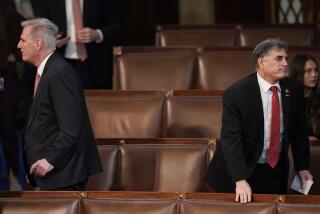Gorbachev Wins Battle on Party Role
- Share via
MOSCOW — President Mikhail S. Gorbachev won a key political battle Tuesday when the Soviet Congress, on the opening day of its winter session, refused to support a call from reformists to consider whether the Communist Party should remain enshrined in the constitution as the dominant force in Soviet society.
In a table-pounding speech, Gorbachev said those who want to amend the constitution’s Article 6, which makes the party the “leading and guiding force” of the Soviet Union, are guilty of “political speculation” because they seek to misuse the mood of change in the country and Eastern Europe.
“We don’t need to act on this matter as if it were an emergency,” Gorbachev said. “Why all this drama? We must approach the matter of constitutional changes with great responsibility.”
In East Germany, Hungary, Poland and Czechoslovakia, reform politicians have shifted the role of the Communist Party so that it is no longer guaranteed the position of supreme political power. On Monday, Bulgaria’s leadership proposed a multi-party system.
Progressives in the Soviet Union have sought similar changes, warning that the Kremlin, which opened the way for new thinking throughout Eastern Europe, is now lagging behind.
Poet Yevgeny A. Yevtushenko, who argued in favor of amending Article 6, told the Congress of People’s Deputies: “The authority of the party must not be written in a paragraph. It must prove itself. It is important to the prestige of perestroika (Gorbachev’s reform program), to the prestige of the party, that we change this article.”
Gorbachev, in putting down the challenge to the party’s traditional role, managed to deal handily with what had threatened to be one of the most contentious issues the deputies would discuss.
Nevertheless, hundreds of lawmakers indicated their support of Yevtushenko’s call to put Article 6 on the agenda. The bid to include debate on the issue in the current session was rejected by a vote of 1,138 to 839, with 56 abstentions.
“It was a noble defeat. We got many more votes than I expected,” Yevtushenko told reporters after the tally.
In the same vote, the deputies also turned down calls to debate other constitutional articles dealing with land, property and the distribution of powers between the country’s 15 republics and the central government.
In what appeared to be in part a response to conservative critics who questioned his low-key leadership tactics during a weekend Central Committee plenum, Gorbachev demonstrated a leaner, firmer style in chairing the congressional session.
He stressed the need for the 2,250-member Congress to avoid wasting time and to concentrate its energy on critical economic issues, which are likely to be the focus of most of the debate in the days to come.
“We need drastic reforms,” he said. “So far, there are no improvements in this area. . . . We have many problems and many important questions. But it is the economy that people will be watching to see how we deal with it.”
But a long debate over procedural matters put the Congress behind schedule even on Day One, delaying the presentation of the government’s economic plan by Prime Minister Nikolai I. Ryzkhov.
However, Gorbachev indicated that he will not let glasnost, his policy of openness, be misused as some critics argued it was during the previous free-wheeling session last spring.
He said he will not permit deputies to “manipulate” the proceedings by taking the podium to express views already aired by other lawmakers. In addition, he held each speaker to a strict 60 seconds at the microphone, sounding a buzzer to urge them to sit down, and continually warned that he wanted to hear only from those with new proposals.
Gorbachev demonstrated that he intended to keep a tighter rein on the deputies when he permitted human rights advocate Andrei D. Sakharov to take the podium but cut him short when he began to discuss Article 6, about which Yevtushenko had already spoken. Sakharov turned to Gorbachev and handed him a stack of telegrams that he said supported amending Article 6.
“You come to me. I will give you three files of telegrams,” Gorbachev responded curtly, motioning Sakharov to take his seat.
The Congress, which is scheduled to meet for 10 days, is to consider ratifying legislation passed last month by the smaller Supreme Soviet, including a law that--although stopping short of allowing private property--would widen ownership rights.
Another proposed law would permit farmers to privately lease land and pass it on to their children.
The entire inaugural session of the Congress of Peoples’ Deputies, held from May 25 to June 9, was broadcast live on Soviet television. But this time, only the opening of the Congress was broadcast live; the rest of the proceedings are to be shown, probably in edited form, only in the evenings.
That is because the popularity of the first session cut work productivity by 20% as people across the nation tuned in to listen to the often-rambling speeches about topics ranging from whether V. I. Lenin, the nation’s founder, should be entombed on Red Square to previously unpublicized atrocities carried out under dictator Josef Stalin.
More to Read
Sign up for Essential California
The most important California stories and recommendations in your inbox every morning.
You may occasionally receive promotional content from the Los Angeles Times.












